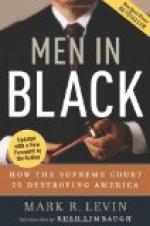The argument for the election of judges is that it keeps the bench more humane, modern, and in touch with the will of the people. The one is the aristocratic idea, the other the democratic. A court as at present constituted is an autocratic institution but the judges should be democrats. A feeling prevails that the man who has gone through a course of political sprouts involving the training of election campaigns, is more understanding of the wants of the people whom he is to serve, also that courts should be arranged on a business basis.
An amusing aspect of an elective judge is that he is in an anomalous position. If he plays politics, endeavors to make friends either by his decisions on the bench or obeying the mandates of a superior political boss as to appointment of referees and receivers, he immediately becomes a corrupt judge. The stench of his unjust decisions will sooner or later come to the nostrils of the community and his chances of reelection are forfeited. He runs the hazard of charges and removal.
If, on the other hand, he forgets the organization that has elected him either in the matter of patronage or the refusal of some desired court remedy, and so conducts his court that there shall be neither fear nor favor, he is a political ingrate and deserves neither reelection nor promotion. Of course these are the two extremes; fortunately human nature is not what the sociologists and political theorists would make it.
The political boss is not the unscrupulous ogre that the muck-rakers picture. He does not order the judge to decide the hundred-thousand-dollar-contract case in favor of his hench man. He might like to have him do so but he does not ask. Neither does the judge lean over backwards in the other direction and imprison the contractor because he is a friend of the boss. The movements for the non-partisan election of judge show the recognition of some of these incongruities.
The fierce bright light that plays about a throne also makes the judge conspicuous. If he sneezes, if he coughs, if he takes a glass of water he is probably feverish and cross. If he keeps still he is going to sleep and not paying attention. If he gets up or sits down it is noted as indicative of how he is going to decide the case. Every movement is watched. The position of a judge is not enviable. He is the concrete object to which the evils of the court-room attach. To the popular mind he is the court, the law, the method of procedure, the source of all the technicalities, and the delays. The beaten side will bear him a grudge, and the winning side think they ought to have got more.
If he be lenient in interpreting the law, he may be called to account for inability; if he be too strict, he is accused of irritability. If he be too polite, he may seem to be extending favor. A justice of one court, wishing to be kind, once asked a young counselor whose case had been dismissed through a technicality to come up and sit on the bench with him. The young man afterward complained to his friends that the judge wanted to shame him and make him conspicuous.




